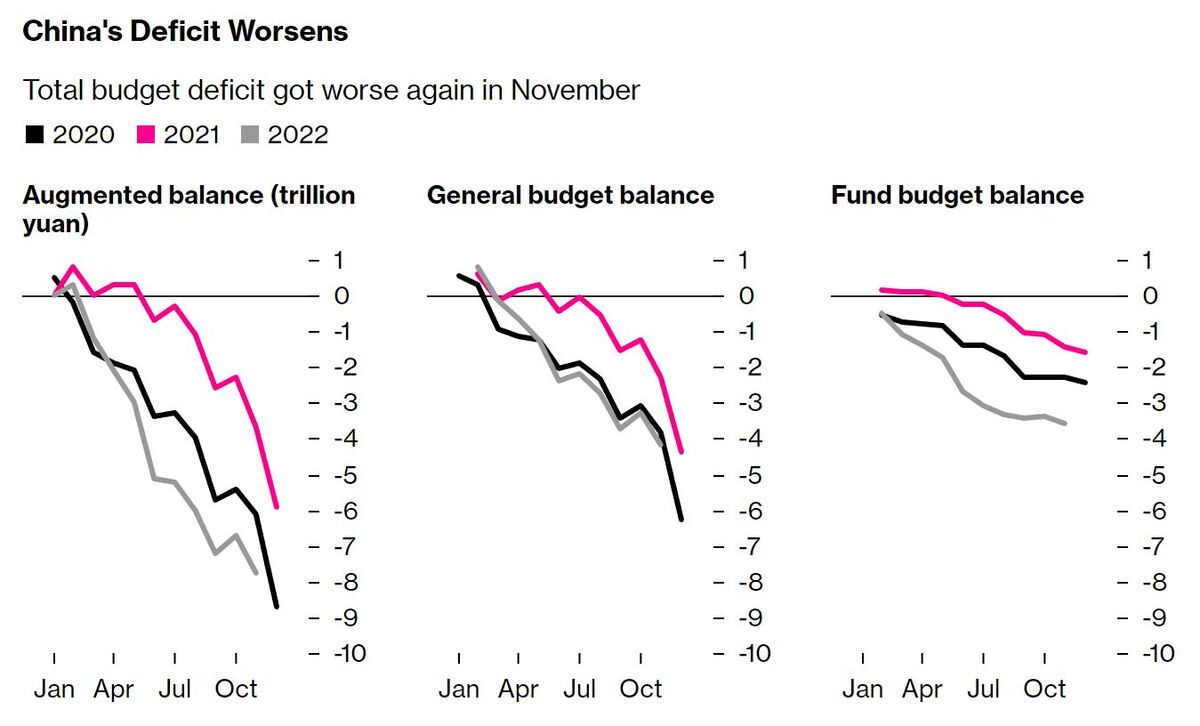Song Hong
SENIOR MEMBER

- Joined
- Jan 4, 2020
- Messages
- 5,058
- Reaction score
- -25
- Country
- Location
中国今年迄今总体财政赤字创下纪录,凸显前不久撤销的防疫清零政策以及持续的楼市低迷对经济和政府财政构成的损害。
彭博根据中国财政部数据计算显示,1至11月整体财政赤字7.75万亿元(人民币,下同),其中囊括全国一般公共预算和全国政府性基金预算收支。
该数据达到去年同期的两倍以上,且高于2020年,当时经济受到首轮疫情的冲击,增速创下了几十年来的最慢。
赤字的扩大凸显了11月末经济形势之严峻,不久之后中国政府便实质上撤销了严格的防疫政策。
作为清零政策核心的封控、检测和隔离规定令消费者和企业开支承压,且在第二季度令经济濒临萎缩边缘。本季度感染人数的激增已令10月和11月零售销售下滑。
防疫政策代价高昂,越来越难以维系。巨额的检测和隔离成本令地方政府不堪重负,而在房地产市场走低的背景下,土地出让和税收收入则大幅下滑。
随着病例席卷全国,地方政府的税收收入和财政状况不太可能立即改善。即便检测和隔离开支减少,但随着更多人病倒,医疗开支可能跃升。房地产市场也没有即刻改善的迹象,有可能令土地出让收入受限。
今年前11个月,全国一般公共预算收入18.6万亿元人民币,同比下降3%,降幅小于截至10月的4.5%。财政部数据显示,扣除留抵退税因素后增长6.1%。
11月份各地政府土地使用权出让收入7150亿元,之前一个月为5520亿元,但同比下降大约13%。今年以来,土地出让收入几乎每月均录得两位数降幅。此外,1至11月契税收入同比下降23.8%。
前11个月全国一般公共预算支出22.7万亿元,比上年同期增长6.2%;1至10月为增长6.4%。全国政府性基金预算支出比上年同期增长5.5%,低于1至10月的9.8%。
《学习时报》周一刊登中国财政部部长刘昆的文章称,预计2022年中国财政支出达到26.3万亿元;2021年为24.6万亿元。

 www.bloomberg.com
www.bloomberg.com

 www.zaobao.com.sg
www.zaobao.com.sg
彭博根据中国财政部数据计算显示,1至11月整体财政赤字7.75万亿元(人民币,下同),其中囊括全国一般公共预算和全国政府性基金预算收支。
该数据达到去年同期的两倍以上,且高于2020年,当时经济受到首轮疫情的冲击,增速创下了几十年来的最慢。
赤字的扩大凸显了11月末经济形势之严峻,不久之后中国政府便实质上撤销了严格的防疫政策。
作为清零政策核心的封控、检测和隔离规定令消费者和企业开支承压,且在第二季度令经济濒临萎缩边缘。本季度感染人数的激增已令10月和11月零售销售下滑。
防疫政策代价高昂,越来越难以维系。巨额的检测和隔离成本令地方政府不堪重负,而在房地产市场走低的背景下,土地出让和税收收入则大幅下滑。
随着病例席卷全国,地方政府的税收收入和财政状况不太可能立即改善。即便检测和隔离开支减少,但随着更多人病倒,医疗开支可能跃升。房地产市场也没有即刻改善的迹象,有可能令土地出让收入受限。
今年前11个月,全国一般公共预算收入18.6万亿元人民币,同比下降3%,降幅小于截至10月的4.5%。财政部数据显示,扣除留抵退税因素后增长6.1%。
11月份各地政府土地使用权出让收入7150亿元,之前一个月为5520亿元,但同比下降大约13%。今年以来,土地出让收入几乎每月均录得两位数降幅。此外,1至11月契税收入同比下降23.8%。
前11个月全国一般公共预算支出22.7万亿元,比上年同期增长6.2%;1至10月为增长6.4%。全国政府性基金预算支出比上年同期增长5.5%,低于1至10月的9.8%。
《学习时报》周一刊登中国财政部部长刘昆的文章称,预计2022年中国财政支出达到26.3万亿元;2021年为24.6万亿元。

China’s Budget Deficit Hits Record $1.1 Trillion on Covid Zero Slump
China’s broad budget deficit hit a record so far this year, showing how damaging the now abandoned Covid Zero policy and the ongoing housing slump have been to the economy and to the government’s finances.

中国前11个月财政赤字创纪录 受经济低迷和清零政策影响
中国今年迄今总体财政赤字创下纪录,凸显前不久撤销的防疫清零政策以及持续的楼市低迷对经济和政府财政构成的损害。彭博根据中国财政部数据计算显示,1至11月整体财政赤字7.75万亿元(人...

